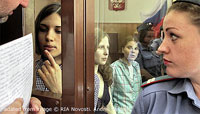Russians' Awareness About Pussy Riot Case Climbs To 84 Per Cent, Poll Shows
Interfax - 8.29.12 - JRL 2012-157
Moscow, 29 August: After the August trial over (three) Pussy Riot band members, fewer Russians see the so-called 'punk prayer' as an act of hooliganism, however the share of those who consider the stunt to be the desecration of a religious relic has grown, a survey has shown.
The share of Russians who know about the February performance of the Pussy Riot band at Christ the Saviour Cathedral has risen from 71 per cent in April to 84 per cent in August, VTsIOM (All-Russia Public Opinion Research Centre) sociologists told Interfax on Wednesday (29 August).
At the same time, the percentage of respondents who first heard about the event in the course of the survey fell from 29 to 15 per cent. The survey was carried out on 25-26 August among 1,600 people in 138 settlements in 46 Russian regions.

file photoAccording to sociologists' information, Muscovites and St Petersburgers (96 per cent), as well as highly-educated Russians (90 per cent), were best informed about what happened at Christ the Saviour Cathedral.
Meanwhile, after the August conviction of three Pussy Riot members, polled Russians started to view the so-called punk prayer as hooliganism less frequently - 46 per cent in April versus 34 per cent in August. However, the number of those who believe the performance to be the desecration of a religious relic has risen (from 21 per cent in April to 24 per cent in August) or an attempt to draw attention (10 and 15 per cent respectively).
Every tenth Russian (11 per cent) presently views what happened as political protest (13 per cent in April), 7 per cent believe the Pussy Riot performance to be a manifestation of extremism (4 per cent in April) and 1 per cent see it as a performance.
According to VTsIOM data, 29 per cent of Russians watched the trial over Pussy Riot. It generated the greatest interest among the residents of the two capitals (Moscow and St Petersburg) (47 per cent against 23-24 per cent among the dwellers of small towns and villages), as well as among highly-educated Russians (38 per cent versus 18 per cent for respondents who have not finished high school).
More than half of the people polled (58 per cent) told sociologists that the trial over the performers did not draw their attention. These were chiefly respondents with high school or vocational education (60-61 per cent), as well as the residents of small towns and villages (60-62 per cent).
Twelve per cent of Russians said that they were hearing about the trial over the Pussy Riot case for the first time during the poll. (Passage omitted to end.)
Keywords: Russia, Law, Crime, Pussy Riot - Russia, Government, Politics - Russian News - Russia - Johnson's Russia List
Moscow, 29 August: After the August trial over (three) Pussy Riot band members, fewer Russians see the so-called 'punk prayer' as an act of hooliganism, however the share of those who consider the stunt to be the desecration of a religious relic has grown, a survey has shown.
The share of Russians who know about the February performance of the Pussy Riot band at Christ the Saviour Cathedral has risen from 71 per cent in April to 84 per cent in August, VTsIOM (All-Russia Public Opinion Research Centre) sociologists told Interfax on Wednesday (29 August).
At the same time, the percentage of respondents who first heard about the event in the course of the survey fell from 29 to 15 per cent. The survey was carried out on 25-26 August among 1,600 people in 138 settlements in 46 Russian regions.

file photoAccording to sociologists' information, Muscovites and St Petersburgers (96 per cent), as well as highly-educated Russians (90 per cent), were best informed about what happened at Christ the Saviour Cathedral.
Meanwhile, after the August conviction of three Pussy Riot members, polled Russians started to view the so-called punk prayer as hooliganism less frequently - 46 per cent in April versus 34 per cent in August. However, the number of those who believe the performance to be the desecration of a religious relic has risen (from 21 per cent in April to 24 per cent in August) or an attempt to draw attention (10 and 15 per cent respectively).
Every tenth Russian (11 per cent) presently views what happened as political protest (13 per cent in April), 7 per cent believe the Pussy Riot performance to be a manifestation of extremism (4 per cent in April) and 1 per cent see it as a performance.
According to VTsIOM data, 29 per cent of Russians watched the trial over Pussy Riot. It generated the greatest interest among the residents of the two capitals (Moscow and St Petersburg) (47 per cent against 23-24 per cent among the dwellers of small towns and villages), as well as among highly-educated Russians (38 per cent versus 18 per cent for respondents who have not finished high school).
More than half of the people polled (58 per cent) told sociologists that the trial over the performers did not draw their attention. These were chiefly respondents with high school or vocational education (60-61 per cent), as well as the residents of small towns and villages (60-62 per cent).
Twelve per cent of Russians said that they were hearing about the trial over the Pussy Riot case for the first time during the poll. (Passage omitted to end.)